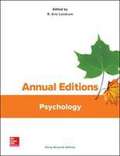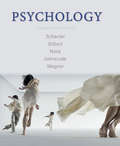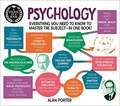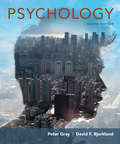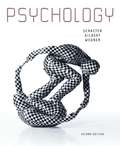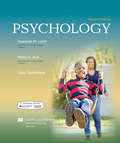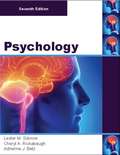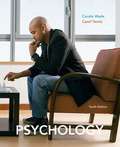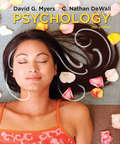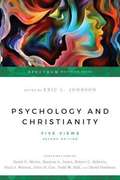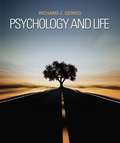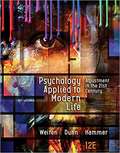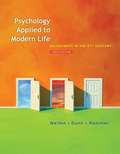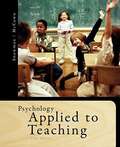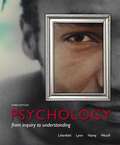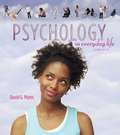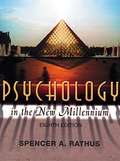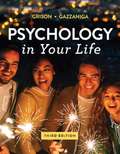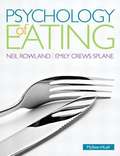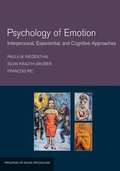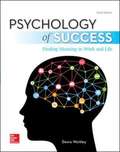- Table View
- List View
Psychology (Annual Editions)
by R. Eric LandrumThe Annual Editions series is designed to provide convenient, inexpensive access to a wide range of current articles from some of the most respected magazines, newspapers, and journals published today. Annual Editions are updated on a regular basis through a continuous monitoring of over 300 periodical sources. The articles selected are authored by prominent scholars, researchers, and commentators writing for a general audience. <p><p> Each Annual Editions volume has a number of features designed to make them especially valuable for classroom use: an annotated Table of Contents, a Topic Guide, an annotated listing of supporting websites, Learning Outcomes and a brief overview for each unit, and Critical Thinking questions at the end of each article. Go to the McGraw-Hill Create™ Annual Editions Article Collection at www.mcgrawhillcreate.com/annualeditions to browse the entire collection. Select individual Annual Editions articles to enhance your course, or access and select the entire Landrum: Annual Editions: Psychology, 47/e ExpressBook for an easy, pre-built teaching resource.
Psychology (Canadian Edition)
by Daniel M. Wegner Daniel L. Schacter Daniel T. Gilbert Matthew K. Nock Ingrid JohnsrudeThis widely used, enthusiastically received textbook is the work of one of the most accomplished author teams in introductory psychology, each a distinguished educator and researcher, and three of them (Schacter, Gilbert, and Wegner) authors of bestselling books for general readers. Together, they offer an approachable, engagingly written survey of the field's main ideas, filled with unusual stories, memorable examples, and lots of humor to captivate all kinds of students. And for this version, coauthor Ingrid Johnsrude from the University of Western Ontario again integrates a wealth of research and examples from Canada, giving Canadian students and instructors an introductory psychology textbook that is truly their own. Again carried by the authors' exceptional communication and teaching skills, the new edition has been retooled for the classroom chapter by chapter. Sections in each chapter now have specific Learning Outcomes in place, to emphasize "big picture" concepts and guide student learning. There is also new boxed feature called A World of Difference highlighting important research on diversity and individual differences, plus new Data Visualization Activities in LaunchPad, to help students build quantitative reasoning skills.
Psychology (Degree in a Book Series)
by Alan PorterThis book provides the reader with an overview of the different areas of psychology that are covered on a typical psychology degree course. Each chapter gives a general overview of the topic and introduces important concepts and research methods. In a series of boxes, important studies, individuals or methods are explored in greater depth. This will allow the reader to get a sense of the general ‘lie of the land’ and also a sense of the style of research carried out in different areas. At the end of the book, there is a section on further reading that provides a short, chapter-by-chapter, bibliography of books suitable for the general reader and textbooks targeted at psychology students.
Psychology (Evolutionary Psychology Ser.)
by David F. Bjorklund Peter O. GrayPeter Gray's evolutionary perspective and emphasis on critical thinking have made his rigorous yet accessible introduction to psychology a widely respected classroom favorite, edition after edition. Now thoroughly revised, with the help of new co-author David Bjorklund, Psychology, Eighth Edition, invites and stimulates students to investigate the big ideas in psychological science.
Psychology (Ninth Edition, In Modules)
by David G. MyersThis ninth edition of Psychology, Ninth Edition in Modules is so much improved over the previous work. Changes include: * some 1300 new research citations representing the most exciting and important new discoveries in our field, * organizational changes based on changes in the field (for example, the heavily revised Consciousness unit, which now follows The Biology of Mind unit and is titled Consciousness and the Two-Track Mind to reflect the dual processing and cognitive neuroscience themes), * fine-tuned writing with countless small and large improvements in the way concepts are presented, supported by the input and creative ideas of hundreds of contributing instructors and students, and from my longtime editors, * a sharp new art program and new pedagogy that teaches more effectively, * continually improving coverage of cultural and gender diversity issues, and * 44 fewer pages.
Psychology (Second Edition)
by Daniel M. Wegner Daniel L. Schacter Daniel T. GilbertThoroughly revised and updated, the second edition of this popular introductory psychology textbook introduces effective new teaching techniques as well as a range of new topics. Clear and engaging, the book provides a fundamental insight into how the mind works.
Psychology (Second Edition)
by Deborah M. Licht Misty G. HullThoroughly revised with input and insight from many of the hundreds of adopters of the groundbreaking first edition, Scientific American: Psychology continues to set a new standard for the introduction to psychology. Deborah Licht and Misty Hull continue to combine their years of research and teaching insights with the journalistic skill of science writer Coco Ballantyne. Together, they have created an introductory psychology resource that combines print and digital components into a seamless learning experience. The project draws on written profiles and video interviews of 27 real people to help students better understand, remember, and relate to psychology’s basic ideas. Beautifully designed, the printed text is filled with high-interest examples and features, including full-page infographics that help students understand and retain key concepts. Online, additional author-created resources, including scaffolded activities and adaptive quizzes, provide a seamless learning experience for students and a reliable assessment mechanism for instructors and programs. This innovative collaboration between Worth Publishers and Scientific American reflects a commitment to engaging and educating all students, including those who sometimes seem difficult to engage—in the contemporary style of the world’s most respected science magazine.
Psychology (Seventh Edition)
by Lester M. Sdorow Cheryl A. Rickabaugh Adrienne J. Betz<p>If you have not adopted this book in the past, we believe that you will find that your students will be eager to read it and to learn from it. You will find that the book achieves interest and readability while also accomplishing the following goals: <p> <li>Portraying psychology as a science <li>Demonstrating the superiority of science over common sense <li>Showing that psychological research occurs in a sociocultural context <li>Illustrating the relevance of psychology to everyday life <li>Encouraging critical thinking in all aspects of life, particularly in regard to the media <li>Placing psychology in its intellectual, historical, biographical, and sociocultural contexts</li> </p>
Psychology (Tenth Edition)
by Carol Tavris Carole WadeThis text emphasizes the importance of critical thinking and the integration of culture and gender in the science of psychology and focuses on the development of critical thinking skills crucial to students' success in college and in later life.
Psychology (Twelfth Edition)
by David G. Myers C. Nathan DewallDavid Myers' new partnership with coauthor C. Nathan DeWall matches two dedicated educators and scholars, each passionate about teaching psychological science through writing and interactive media. <P><P>With this new edition of the #1 bestselling Psychology, Myers and DeWall take full advantage of what an integrated text/media learning combination can do. New features move students from reading the chapter to actively learning online: How Would You Know puts students in the role of scientific researcher and includes tutorials on key research design principles; Assess Your Strengths self-tests help students learn a little more about themselves, and include tips about nurturing key strengths. <P><P>These and other innovations rest on the same foundations that have always distinguished a new David Myers edition--exhaustive updating (hundreds of new citations), captivating writing, and the merging of rigorous science with a broad human perspective that engages both the mind and heart. This edition of Psychology is accompanied by its own dedicated version of Worth Publishers' breakthrough online course space, featuring a fully integrated e-Book, LearningCurve adaptive quizzing, a rich collection of student media resources, and easy setup, assessment, and course management options for instructors. <P>What's in the LaunchPad
Psychology And Christianity: Five Views (Second Edition) (Christian Association For Psychological Studies Books)
by David G. Myers Eric L. Johnson Robert C. Roberts Stanton L. Jones David A. Powlison P. J. Watson John H. Coe Todd W. HallHow are Christians to understand and undertake the discipline of psychology? This question has been of keen interest (and sometimes concern) to Christians because of the importance we place on a correct understanding of human nature. Psychology can sometimes seem disconnected from, if not antithetical to, Christian perspectives on life. How are we to understand our Christian beliefs about persons in relation to secular psychological beliefs? This revised edition of a widely appreciated text now presents five models for understanding the relationship between psychology and Christianity. All the essays and responses have been reworked and updated with some new contributors including the addition of a new perspective, the transformative view from John Coe and Todd Hall (Biola University).
Psychology And Life
by Richard J. GerrigPsychology and Life, 20th edition provides the perfect balance of science and accessibility so that students can understand research and its application to daily life. Richarg Gerrig combines classic and cutting-edge research studies with an engaging and student friendly writing style.
Psychology Applied To Work
by Paul Muchinsky Satoris HowesThe 12th edition of Psychology Applied to Work presents the story of I/O psychology as told through the most recent research, summarized in a focused and easy-to-comprehend manner. Five special features appearing throughout the book highlight the impact of I/O psychology on key contemporary issues and are designed to enhance student engagement in the field.
Psychology Applied to Modern Life: Adjustment in the 21st Century
by Wayne Weiten Dana S. Dunn Elizabeth Yost Hammer Margaret LloydFilled with comprehensive, balanced coverage of classic and contemporary research, relevant examples, and engaging applications, this text shows you how psychology helps you understand yourself and the complex social world around you. It also uses psychological principles to illuminate the variety of opportunities you have in your life and your future career.<P><P> While professors cite this bestselling book for its academic credibility and the authors' ability to stay current with 'hot topics,' students say it's one text they just don't want to stop reading. The text and associated workbook are highly readable, engaging, and visually appealing, providing you with a wealth of material you can put to use every day. Also available: the MindTap online learning experience, featuring an eBook, activities that engage you in thinking about common misconceptions about psychology, animations that introduce key concepts, cool apps (including a text-to-speech reader), and more.
Psychology Applied to Modern Life: Adjustment in the 21st Century (10th Edition)
by Wayne Weiten Dana S. Dunn Elizabeth Yost HammerFilled with comprehensive, balanced coverage of classic and contemporary research, relevant examples, and engaging applications, this book shows you how psychology helps you understand yourself and the world--and uses psychological principles to illuminate the variety of opportunities you have in your life and your future career.
Psychology Applied to Teaching (13th Edition)
by Jack Snowman Rick Mccown Robert BiehlerPsychology Applied to Teaching, 13th Edition combines fresh concepts and contemporary research with long-standing theory and applications to create a book that addresses the needs of today's teachers and students.
Psychology From Inquiry to Understanding, Third Edition
by Scott O. Lilienfeld Nancy J. Woolf Laura L. Namy Steven Jay LynnProvides students with the tools they need to go from inquiry to understanding.<P> Psychology: From Inquiry to Understanding, 3/e provides the framework students need to go from inquiry to understanding by continuously modeling the application of the six key principles of scientific thinking. The text teaches students how to test their assumptions, and motivates them to use scientific thinking skills to better understand the field of psychology and the world around them.<P> MyPsychLab is an integral part of the Lilienfeld / Lynn / Namy / Woolf program. Key learning applications include writing assessment, MyPsychLab video series, and simulations.<P> This text is available in a variety of formats – digital and print. Pearson offers its titles on the devices students love through Pearson’s MyLab products, CourseSmart, Amazon, and more.<P> Teaching & Learning Experience<P> This program will provide a better teaching and learning experience -- for you and your students. Here's how:<P> * Personalize Learning – MyPsychLab is an online homework, tutorial, and assessment program. It helps students prepare for class and instructor gauge individual and class performance.<P> * Improve Critical Thinking – Numbered learning objectives and section summaries help readers build critical thinking and study skills.<P> * Engage Students – Visual activities, such as labeling of figures and completion of summary tables, help students review key concepts.<P> * Explore Research – “Apply Your Scientific Thinking Skills” questions are tied to outside research assignments.<P> * Support Instructors – Support Instructors—A full set of supplements, including MyPsychLab, provides instructors with all the resources and support they need.<P>
Psychology In Everyday Life, 2nd Edition
by David G. MyersCarried by the author's acclaimed empathetic voice, Psychology in Everyday Life is David Myers' most inviting text to date. This book represents a breakthrough in the interplay of text and visuals, yet, as always, provides a rich source of scientific insights into the lives we live. Any student, regardless of age or background, will find it a text that speaks directly to him or her, and will embrace it not just for its grade-raising potential, but for its revelations about what makes a person a stronger student, a more tuned-in friend or partner, a more effective worker, or a wiser parent.
Psychology In The New Millennium, 8e
by Spencer A. RathusThis best-selling text not only explores psychological theory and research, but also emphasizes their application to the lives of students. Spencer Rathus is a talented author with a widely celebrated writing style that makes psychology interesting, appealing, and relevant for students. A great amount of detail has gone into updating this text, including: the additions of a new chapter, "Adolescent and Adult Development;" a new feature, "Controversy in Psychology," which embraces controversies in psychology as vehicles for enhancing knowledge and stimulating critical thinking; and a new pedagogical approach, PQ4R (outlined below). This new edition also features greater emphasis on the evolutionary perspective, as well as a new connection to the Web and the text's CD-ROM using the author's trademarked method.
Psychology In Your Life
by Sarah Grison Michael GazzanigaAuthor Sarah Grison--an expert in the teaching of introductory psychology--has created a print and digital package with an equal commitment to the success of every instructor and student. A strong, author-driven support package--rich with original media, a test bank, Active Learning slides, and InQuizitive adaptive learning modules--provides instructors with everything they need to help today's students understand and apply introductory psychology.
Psychology Of Eating
by Emily Crews Splane Neil RowlandPsychology of Eating provides a multi-disciplinary overview to the study of eating; it examines current research in biology, nutrition, psychology, and more. The text's balance of major theories, historical and current research, and real-life examples enables students to understand and interact with the material presented.
Psychology Of Emotion: Interpersonal, Experiential, And Cognitive Approaches
by Paula M. Niedenthal Silvia Krauth-Gruber François RicThis textbook discusses fundamental issues in the definition and measurement of emotion, including: conscious and unconscious processes; the ways in which emotions arise in, and are constrained by, social situations and social processes; the regulation and sharing of emotion and their effects of mental health; and the manner in which culture (including subculture) shapes or moderates some of these processes. The book also focuses on the component processes of emotion, their functions, and the ways in which these interact with the social environment. Rather than deny either that emotions are biologically determined or that they are culturally created or shaped, both biology and social situation are treated as important forces in the elicitation and the experience of emotion. Each section of the book is structured around specific approaches or models, and the precise questions that they were constructed to address. The theories and models are also placed in their in historical context. Discussion of the different approaches is elaborated by summaries of the extant scientific evidence, as well as examples of specific experiments or studies that were designed to evaluate the question. Timely, engaging real-world examples are used from a variety of international contexts. The pedagogic features, including concise introductions and summaries, discussion questions, and suggested readings, have been incorporated into the volume, making this an ideal text for a course of Emotion, which can be found as an option within many social psychology and cognitive psychology courses.
Psychology Of Success
by Denis WaitleyPsychology of Success introduces the fundamental psychological principles of success--principles applicable to everyone regardless of age, background, or specialty. Unlike many psychology books, Psychology of Success doesn't take a one-size-fits-all approach. Instead, it asks you to take an active role in defining what is right for you as an individual. Psychology of Success calls on you to use self-awareness and critical thinking strategies to examine your dreams, values, interests, skills,needs, identity, self-esteem, and relationships. This will help you set and achieve goals that are in harmony with your personal vision of success.
Psychology Part 1 222 NIOS
by National Institute Of Open SchoolingPsychology textbook for Secondary level NIOS
Psychology Part2 222 NIOS
by National Institute Of Open SchoolingPsychology textbook for Secondary level NIOS
